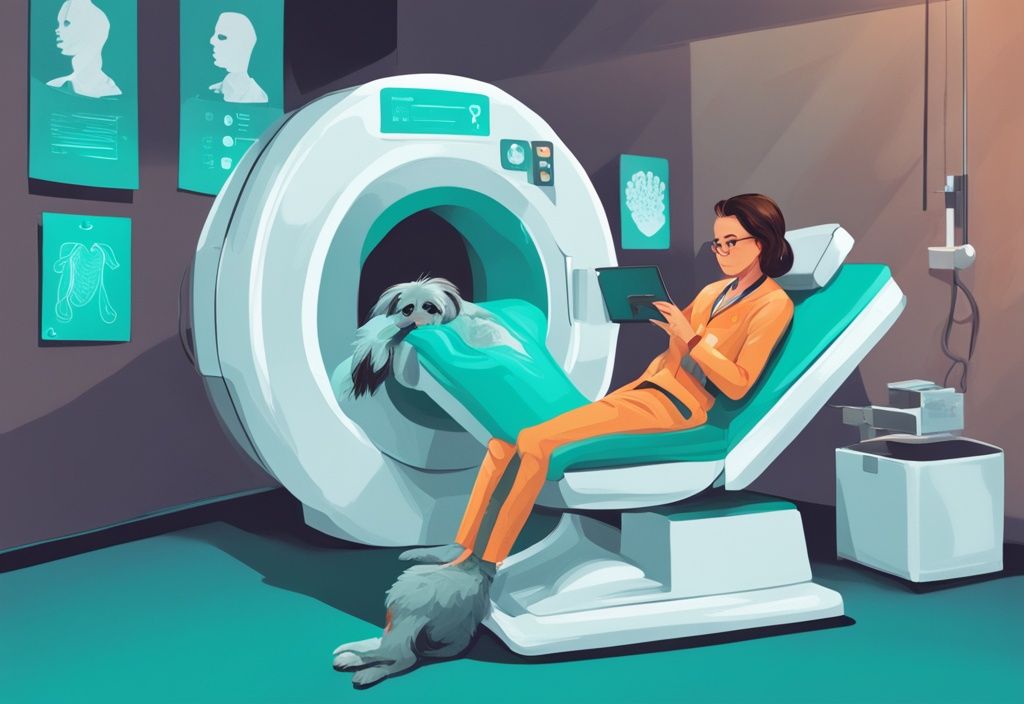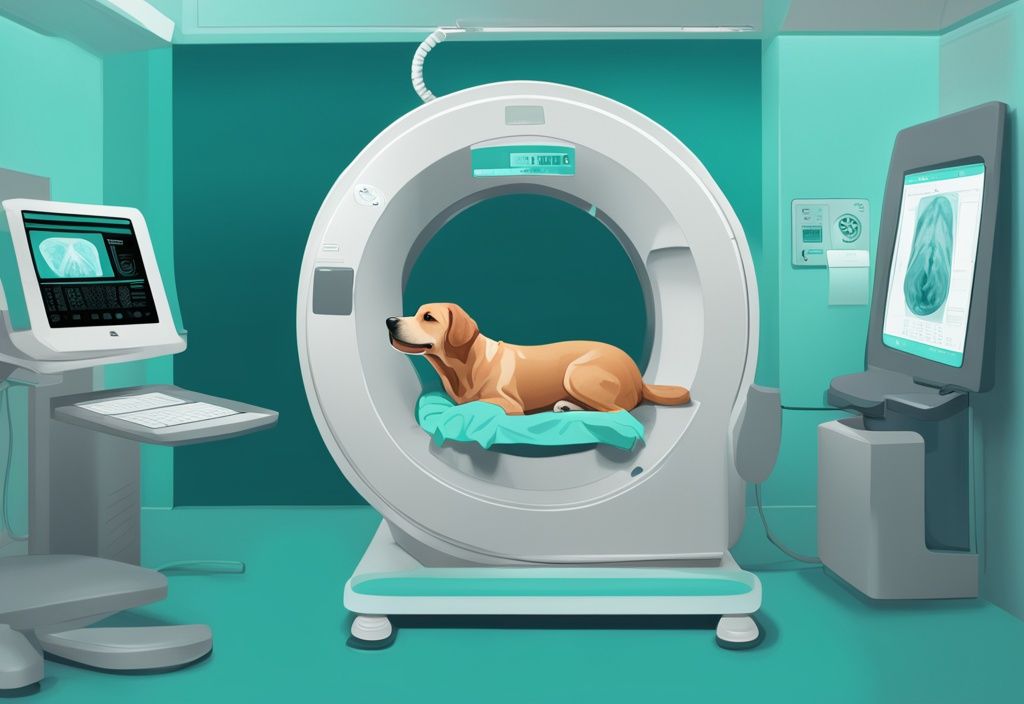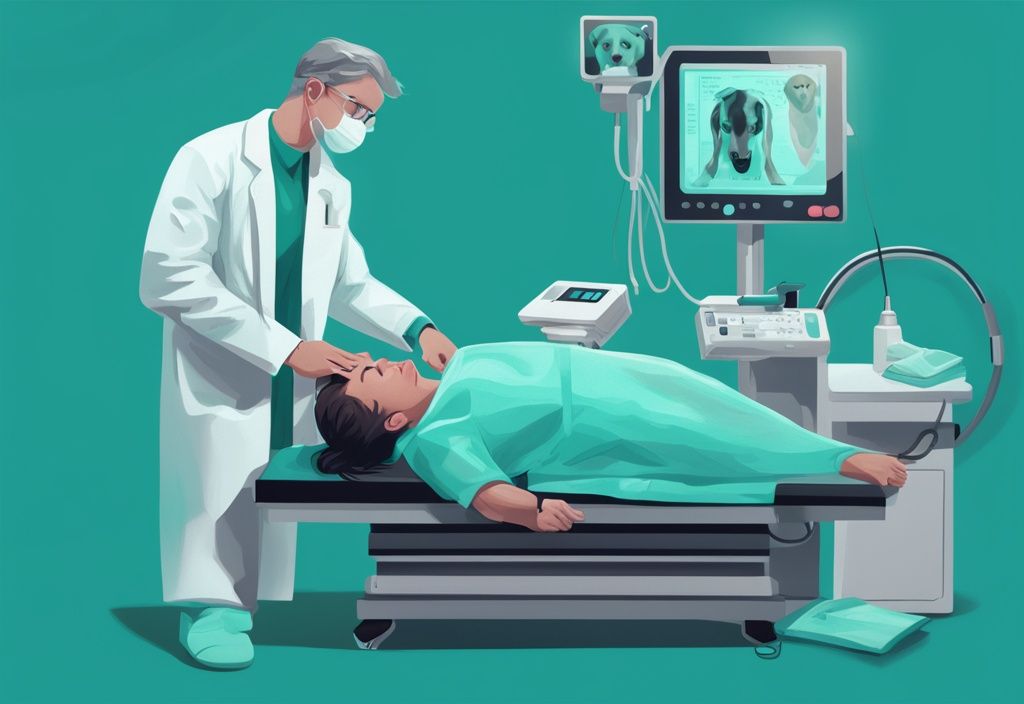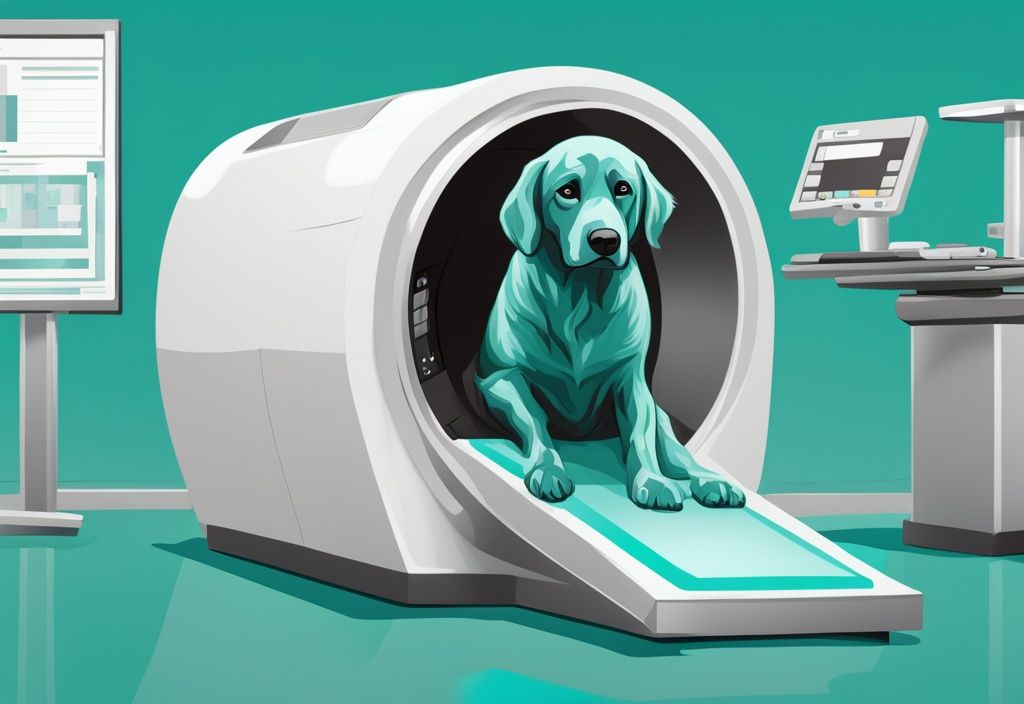Ever caught yourself in the muddle, wondering, “how much is a dog CT scan?” Oh, the stresses of 21st-century dog parenting! I feel you. It’s like sitting between a rock and a hard place: the health of your cherished furball and the weight of your wallet. I’ve been there with my Border Collie, Max!
Stay with me, because I am going to roll out a comprehensive cost breakdown of a dog CT scan for 2024. From why your vet might suggest one, to the nitty-gritty figures that might take a bite out of your savings – it’s all here in this snug little guide.
So whether you’re planning ahead or facing a tough decision right now, let’s dive in together and help unravel some of the confusion, so you can make an informed choice for your beloved pet’s health.
Essential Things to Know About a Dog CT Scan
Understanding a dog CT scan, its benefits, and its costs can provide much-needed clarity when it comes to your furry friend’s healthcare. This section covers the basics, why a CT scan might be necessary, and delves a bit into the financial side, including how much is a dog CT scan.
What is a Dog CT Scan?
A Dog CT (Computed Tomography) scan is a marvel of modern veterinary medicine, providing detailed insights into your pet’s health, as explained in more detail here: https://www.petmd.com/dog/general-health/ct-scans-pets-everything-you-need-know. Imagine this: it’s like a super-powered X-ray that takes an ultra-detailed, 360-degree look inside your dog’s body. Unlike the flat, 2D images from standard X-rays, a CT scan gives vets a comprehensive map of what’s going on inside your pup. This nifty tool uses X-rays to produce incredibly detailed cross-sectional images, revealing the inner workings of organs, bones, blood vessels, and tissues that might stay hidden with regular X-rays.
Why is a Dog CT Scan Needed?
Dog CT scans are like the Sherlock Holmes of veterinary diagnostics. These scans can uncover tricky mysteries inside your pet’s body, helping diagnose everything from sneaky cancers to covert neurological disorders. For instance, it can detect hidden injuries or pinpoint the progress of diseases, giving vets crucial insights. Imagine needing to find out just how far a condition like cancer has spread—this scan has the answers! Plus, when it comes to planning surgeries or treatments, having a detailed view of the affected areas is invaluable.
And let’s talk about the moolah—understanding how much is a dog CT scan can help you prepare for the costs. It’s always a bit of a relief to have a ballpark figure when facing essential and often life-saving procedures for your cuddly companion.
Cost of a Dog CT Scan – A Detailed Breakdown
General Range of Dog CT Scan Costs
Diving into the world of pet healthcare can be like navigating a maze! The cost of a dog CT scan can vary widely, typically stretching from $1,500 to $3,500. Here’s a quick breakdown:
- General vet clinics: $1,500 – $2,000
- University vet teaching hospitals: $1,500 – $2,500
- Mobile or standalone imaging centers: $1,500 – $3,000
- Specialty vet hospitals: $2,000 – $3,500+
Quite the range, right? It all depends on where you go and the level of expertise involved. Think about it as choosing between getting your pet’s portrait taken at a local studio versus a high-end professional photographer.
Expenses Involved
Cost of the CT Scan
The main slice of the pie is, of course, the CT scan itself.
Invalid YouTube video ID
Expect to shell out between $800 and $1,000 for the actual imaging process. This fee covers the use of the CT scanner and ensures you get those detailed images needed for an accurate diagnosis.
Vet Consultation Fee
Before you dive into the CT scan, a vet will need to check on your furry friend’s health. This initial visit usually costs between $40 and $80. There might be additional charges for follow-up consultations to discuss the results and next steps. It’s a bit like booking a preliminary meeting with a party planner before the big event!

Costs for Pre-scanning Procedures
Pre-scanning procedures are essential to ensure everything goes smoothly. Here’s what to expect:
- Pre-anesthesia bloodwork: $100 – $200
- Pre-anesthesia chest X-ray: $150 – $250
These steps guarantee your dog is in tip-top shape for anesthesia, akin to a pre-flight checklist to ensure a safe journey.
Anesthesia Expenses
Keeping your pup still during the scan requires anesthesia, costing between $200 and $500. Sometimes, contrast agents are needed to get clearer images, adding an extra $500 to $1,000. It’s like adding a filter to get that perfect Instagram shot!
Costs for Post-Scan Care
After the scan, ensuring your dog recovers well from anesthesia is paramount. Post-scan care typically ranges from $100 to $200. If there’s a need for overnight hospitalization, you might be looking at $100 to $600 or more, depending on the care required. Think of it as booking a cozy recovery suite for your beloved pet.
Radiologist’s Fees
The images need expert interpretation by a radiologist, with fees ranging from $150 to $350 or more. This cost varies based on the provider and the complexity of the readings. It’s like hiring an art expert to analyze an intricate painting – the details make all the difference!
Factors Affecting the Price of a Dog CT Scan
Your Location
Ever wondered how much a dog CT scan might cost? Buckle up, because your location plays a pivotal role! Urban regions, with their bustling streets and high living costs, often charge more for veterinary services. Think of it like a city pizza versus a countryside slice – the former is pricier due to higher operational costs, rent, and staff salaries. On the flip side, rural areas, with their picturesque simplicity, might offer more wallet-friendly rates thanks to lower overhead expenses. Isn’t that a breath of fresh air for your finances?
Size and Type of Your Dog
Now, let’s talk about the star of the show – your furry friend. The size and type of your dog significantly impact how much that CT scan will drain your wallet. Larger dogs, like my energetic Border Collie, Max, usually need more sedation or anesthesia. This, naturally, cranks up the cost. Then there are those adorable breed-specific quirks. Some breeds might need specialized imaging techniques or contrast agents to get a clear picture, so the final bill can be a bit steeper. Every wag, woof, and wiggle counts, right?
Medical Complexity of Your Dog
Your dog’s health is a beautiful, complex tapestry that also weaves into the cost of a CT scan. If your pup has a complicated medical condition, prepare for a bit of a financial rollercoaster. Extra imaging, longer scan times, or specialized equipment might be in the cards. And heaven forbid if you’re in an emergency – those last-minute needs can spike the price. Concurrent health issues? They add another layer of expense. It’s like planning a grand adventure; sometimes, the more stops you need to make, the higher the ticket price!
Available Pet Insurance and Financing Options
Pet Insurance: What’s Covered?
Pet insurance can be a lifesaver when it comes to covering how much is a dog CT scan. If your vet deems it medically necessary, many insurance providers will cover this procedure. Typically, this coverage includes imaging costs, anesthesia, and even aftercare. But here’s the catch: each provider has its own rules, so it’s crucial to dive into those policy details.
Before booking that CT scan, have a chat with your insurance company to nail down exactly what’s covered. Picture me and my Border Collie, Max, doing a happy dance when my insurance covered his scan—it makes a huge difference knowing you have support.
Financing Choices and How to Choose the Best One
So, what if pet insurance doesn’t have you fully covered? There are several financing options to help manage how much is a dog CT scan. Many vet clinics offer payment plans, spreading the cost out over several months. Think of it like buying time, just like I did when Max needed some pricey tests.
For another solid option, check out services like CareCredit, which offer credit designed for veterinary expenses. Depending on the terms, you might snag low or even no interest! That’s more treats for Max in my book.
But wait, there’s more! If the costs seem insurmountable, crowd-funding could be your hero. Platforms like GoFundMe let pet parents rally support for their furry friends’ medical needs. Trust me, the pet-loving community is a generous bunch.
When you’re weighing these options, factor in the interest rates, repayment terms, and any sneaky fees. It’s like picking a toy for Max—not too expensive, but built to last.
By exploring these insurance and financing routes, you’ll find that taking care of your furry family members doesn’t have to break the bank. Less financial stress means more time for belly rubs and tail wags. Happy pet parenting!

Alternatives to Dog CT Scans and Their Pricing
Searching for imaging options for your furry friend? This section breaks down some practical alternatives to dog CT scans, including costs and procedures you might encounter.
Dog X-Ray: Costs and Procedure
If you’re scratching your head and thinking, “how much is a dog CT scan,” an X-ray might save you some kibble. The cost for a dog X-ray typically falls between $150 and $250, depending on where you are and which vet you visit. Sure, X-rays don’t spill the beans on as many details as CT scans do, but they’re terrific for pinpointing simpler issues like fractures or joint problems. For many vets, X-rays are the go-to initial screening tool—kind of like the trusty old stethoscope of imaging.
Ultrasound for Dogs: An Overview and Pricing
Ever heard the soft buzz of an ultrasound machine? This is another excellent alternative to a CT scan, especially if your pup needs soft tissue checked out, like their abdomen or heart. Ultrasound prices usually range from about $300 to $600 or more. This tech wizardry uses sound waves to create real-time images of organs. Ultrasounds are fantastic for diagnosing conditions related to the liver, kidneys, and even checking on expectant pooches. Though not as detailed in some cases as CT scans, they hold a special place in a vet’s toolkit.
Economic Alternatives: Dog Fluoroscopy and MRI
Have you heard of dog fluoroscopy? Think of it as the video version of an X-ray. This continuous X-ray method is great for observing movements inside your pup’s body, like how they swallow or how food travels through their digestive system. And guess what? It’s budget-friendly too, usually costing between $300 to $800, bringing valuable insights without the hefty CT scan price tag.
Now, for those intricate situations—especially anything involving the brain or spine—an MRI (Magnetic Resonance Imaging) for your dog might be in order. It’s the Sherlock Holmes of imaging techniques, digging deep into the details. Expect to shell out between $2,500 and $3,500 for an MRI. Yes, it’s a bit of a splurge, but the diagnostic precision is often indispensable for treating complex conditions. Sometimes, it’s the exact solution your fur baby needs to get back to their tail-waggin’ self.
Highlights on the Safety and Efficiency of Dog CT Scans
Dog CT scans are becoming a cornerstone in veterinary diagnostics, offering detailed images that play a crucial role in identifying various medical conditions in our furry friends. Let’s dive into the safety protocols and the numerous benefits these scans provide.
Safety Measures During a CT Scan for Dogs
Ensuring your dog’s safety during a CT scan is paramount. Typically, these procedures are conducted by highly skilled professionals who leave no stone unturned when it comes to following rigorous safety protocols.
First off, a thorough health evaluation is key. Prior to the scan, your veterinarian will assess if your dog is fit for anesthesia, usually conducting pre-anesthesia bloodwork and chest X-rays. Although anesthesia is generally safe, there are inherent risks like cardiovascular complications. But fear not! These risks are significantly reduced thanks to the expertise of veterinary anesthesiologists who handle the anesthesia with utmost care.
During the scan, continuous monitoring of your dog’s vital signs is a must. The imaging equipment, which uses advanced technology, is meticulously calibrated and maintained. This minimizes X-ray exposure, strictly adhering to safety standards. The controlled environment of the imaging facility ensures that everything is as safe and efficient as it can be, drastically lowering any chance of adverse effects. For pet owners interested in ensuring the well-being of their pets, you might want to check out our comprehensive Badlands Ranch dog food review.
Benefits of CT Scans for Diagnosis
CT scans are like a superhero in the world of pet medical diagnostics. They offer detailed cross-sectional images of your dog’s body that traditional X-rays simply can’t match. These high-resolution images allow veterinarians to spot and evaluate a wide range of conditions with remarkable accuracy.
For instance, imagine dealing with complex medical issues like cancers, neurological disorders, or internal injuries. CT scans become the go-to solution, providing a comprehensive view that can spot even the tiniest tumors or subtle changes in tissue structure. It’s like having a super-powered magnifying glass that other methods might miss.
Thanks to these thorough images, CT scans are vital for effective treatment planning. They enable vets to devise precise surgical or therapeutic interventions, tailored exactly to what your furry friend needs. This means better care and improved outcomes for our beloved pups.
In essence, CT scans bridge gaps in diagnostic information, ensuring nothing is overlooked. This thorough approach enhances the overall quality of veterinary care, giving your dog the best chance at a healthy and happy life.
Preparing Your Dog for a CT Scan and What Comes After
Before the big day when you find out how much a dog CT scan is and schedule one for your furry friend, it’s vital to get all your ducks in a row.
Pre-Scan Tips
Prior to taking your dog for a CT scan, it’s essential to follow specific pre-scan instructions to ensure the process goes smoothly. Got a pup heading in for general anesthesia? Stick strictly to the food and water restrictions your vet sets out. Your dog usually shouldn’t eat for several hours before the procedure to prevent anesthesia-related complications. Trust me; Max once gave me the ol’ puppy eyes, but rules are rules!
Additionally, ensure all pre-scan tests like bloodwork and a chest X-ray are wrapped up. These tests check your dog’s overall health and whether they’re fit for anesthesia. They also help spot any sneaky health issues hiding that could mess with the procedure.
Post-Scan Dog Care
Once the CT scan is completed, it’s time to switch gears and focus on your pup’s recovery. Anesthesia can pack quite the punch, so keep a close eye on your dog for any quirky behavior, prolonged laziness, or tummy troubles. Following your vet’s post-procedure advice to the letter is crucial. This may include special dietary or activity restrictions (cue Whiskers eyeing Max’s extra nap spot!).
Proper post-scan care accelerates recovery. If your dog needs extra treatments or meds, be vigilant about giving them on time. Sometimes, your dog might need to sleep over at the vet’s office to ensure they’re stable and bouncing back well. Always keep that line of communication open with your vet to tackle any worries head-on.
By following these guidelines, you’re making the CT scan journey as smooth and safe as possible for your furry buddy. This paves the way for a speedy, accurate diagnosis and whatever treatment they may need afterward. Max and Whiskers would surely give you a paws-up for the effort!

Making that Crucial Decision: Discussing with Your Vet
Sometimes, the decisions we make for our furry friends are tough ones. If you’re pondering over whether to get a CT scan for your dog, you’ve come to the right spot. This section will break down everything you need to chat about with your vet.
Asking the Right Questions
When your pup’s health is on the line, open dialogue with your veterinarian becomes vital. Start by asking, “Is a CT scan necessary for my dog’s condition?” Knowing the medical necessity can guide your next steps.
You might wonder, “What are the benefits and risks involved?” It’s essential to grasp both the perks and the hiccups, like possible anesthesia risks. Curious if there’s a plan B? Ask, “Are there any alternative diagnostic methods?” This can open doors to less pricey or less invasive ways to get to the bottom of things.
Weighing the Costs and Benefits
Before moving ahead with a CT scan, let’s talk cash and care. Sure, the price can be a thumper, but think about the snazzy benefits a precise diagnosis can bring. Pinpoint imaging could turn things around dramatically, giving way to tailored treatment for your pooch.
Then, there’s the money talk. Discuss payment plans, insurance coverage, and other financing choices with your vet to juggle costs without skimping on care. Got an urgent case? Sometimes the “how much is a dog CT scan” is not the biggest question—your dog’s well-being demands top priority. Understanding local CT scan costs can also tilt the balance in your decision-making process.
Conclusion
A dog CT scan stands out as a vital diagnostic tool, offering an advanced method for examining various medical conditions. When faced with the question, how much is a dog CT scan?, potential pet owners should be aware that the cost often ranges from $1,500 to $3,500. This price depends on several factors, including the type of veterinary facility and the geographic location.
Sure, the price may seem a tad steep, but think about the benefits! Imagine having a microscopic view inside Max’s wagging body—it’s like a magic window that helps veterinarians diagnose and treat his conditions precisely. Whether it’s cancer, neurological disorders, or internal injuries, these scans provide a level of detail that’s a game-changer for your furry pal’s health.
But let’s be real, while a CT scan is fabulous, you might want to explore some budget-friendlier options. Ever considered an X-ray or an ultrasound? For example, a standard dog X-ray might cost between $150 and $250, making it a wallet-friendly alternative. Each method has its merits, so it’s crucial to weigh the benefits against the costs.
Before you and Max strut into that CT scan, make sure you’ve had a heart-to-heart with your vet. Ask all your burning questions about the necessity of the scan, its benefits, and any potential risks. Are there alternative diagnostic methods that could work? This sort of discussion ensures you’re making choices that fit both Max’s medical needs and your budget.
In essence, while a dog CT scan can significantly enhance the diagnostic capabilities for your dog’s health issues, understanding the full spectrum of options and costs helps in making the best choice for both you and your furry friend.
Frequently Asked Questions
How much does a Dog CT Scan usually cost?
- A dog CT scan typically ranges between $1,500 and $3,500. The precise cost varies based on factors such as location, type of facility, and the complexity of the required imaging.
Will Pet insurance help with the costs?
- Yes, pet insurance may cover CT scans if they are deemed medically necessary as part of the treatment plan for your dog.
What factors could potentially spike up the costs?
- Costs may increase due to geographic location, the dog’s size, the complexity of the medical condition, emergency services, and additional diagnostic procedures needed.
What are the more budget-friendly alternatives to a Dog CT Scan?
- Dog X-rays ($150 – $250) and ultrasounds ($300 – $600+) are budget-friendly alternatives. Fluoroscopy is another option, typically costing between $300 and $800.
Is it safe for a Dog to undergo a CT Scan?
- Generally, a CT scan is safe for dogs when performed by qualified professionals. However, there are minor risks related to anesthesia.
How do I prepare my Dog for a CT Scan?
- Follow your veterinarian’s specific instructions about food and water restrictions. Complete all necessary pre-scan tests like bloodwork and chest X-rays, and address any concerns with your vet.
